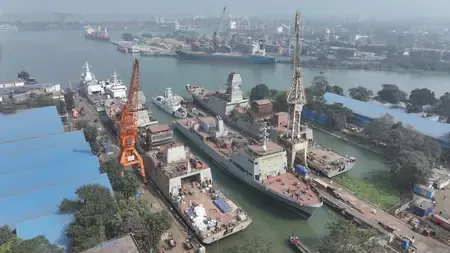Is the Centre’s Rs 69,275 crore package set to transform India's shipbuilding industry?

Synopsis
Key Takeaways
- Government investment of Rs 69,725 crore for shipbuilding.
- Shipbuilding sector creates 6.4 times more jobs per investment.
- The Maritime Development Fund aims to encourage investments.
- Infrastructure status for large ships to facilitate financing.
- MoUs signed to develop shipbuilding clusters across India.
New Delhi, Oct 14 (NationPress) The Indian government has unveiled a significant investment package of Rs 69,725 crore aimed at enhancing the shipbuilding and maritime sectors, marking a transformative phase for the industry this year.
Often referred to as the "mother of heavy engineering", shipbuilding is vital for generating employment, attracting investments, and fortifying national security and strategic autonomy. The economic impact of India’s shipbuilding sector is substantial; every investment generates 6.4 times more jobs and yields 1.8 times the capital, showcasing its potential to drive growth, as stated in an official announcement.
The Shipbuilding Financial Assistance Scheme, with an allocation of Rs 24,736 crore, aims to provide financial support, ship-breaking credit notes, and promote domestic manufacturing through the National Shipbuilding Mission.
The Maritime Development Fund, comprising Rs 25,000 crore, is dedicated to investment incentives and interest subsidies, while the Shipbuilding Development Scheme offers capital assistance, risk coverage, and capacity enhancement for shipbuilding clusters with an allocation of Rs 19,989 crore.
Additionally, large ships have been granted infrastructure status to facilitate domestic shipbuilding through improved financing options.
These initiatives are designed to modernize infrastructure, enhance domestic production capabilities, and attract international investments, thereby laying a robust foundation for sustainable growth.
By prioritizing innovation, sustainability, and skill enhancement, the sector is poised to fulfill the strategic objectives outlined in Maritime India Vision 2030. Its growth trajectory aligns seamlessly with the overarching national ambition of Viksit Bharat 2047, contributing to economic resilience, job creation, and global competitiveness. With ongoing collaboration between the government and the industry, India’s shipbuilding sector is set to emerge as a critical component of the nation’s maritime strength and an engine for inclusive growth, the statement emphasized.
Historically, post-independence shipbuilding primarily thrived within public sector units like Mazagon Dock Shipbuilders Ltd in Mumbai, Garden Reach Shipbuilders & Engineers Ltd in Kolkata, and Hindustan Shipyard Ltd in Visakhapatnam. In the last decade, the entrance of private players into the sector has significantly transformed India’s maritime landscape, leading to notable advancements in cruise tourism, inland water transport, and port infrastructure. Strategic investments, policy reforms, and expanded waterways have collectively enhanced cargo movement and coastal connectivity.
Memorandums of Understanding (MoUs) have been established between major ports and coastal states to cultivate shipbuilding clusters through joint investments, aspiring to position India among the top five global shipbuilding nations by 2047. These hubs will encompass shipyards, research and development, small and medium enterprises (MSMEs), and green innovations for sustainable marine engineering.
Both Cochin Shipyard and Mazagon Dock have signed MoUs with Tamil Nadu agencies to establish significant shipbuilding complexes, including a Rs 15,000 crore facility with an annual capacity of one million gross tonnage and extensive job creation.
Moreover, Cochin Shipyard and HD Korea Shipbuilding have collaborated to manufacture large commercial vessels in India, supported by CSL's new dry dock and a proposed Rs 3,700 crore fabrication facility in Kochi, which is anticipated to create thousands of jobs and enhance MSME-linked supply chains, the statement concluded.










